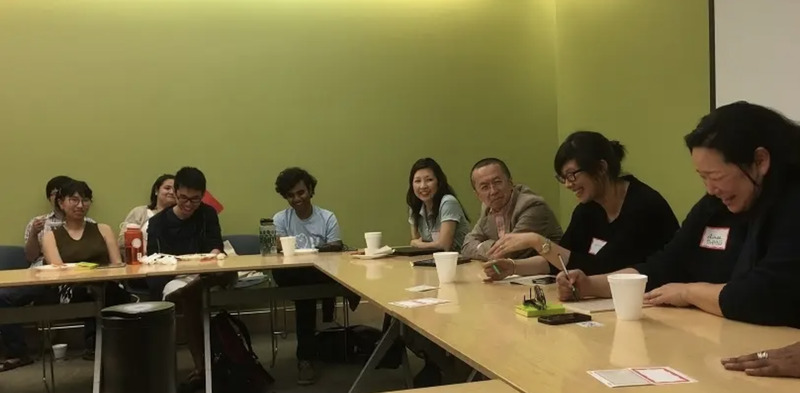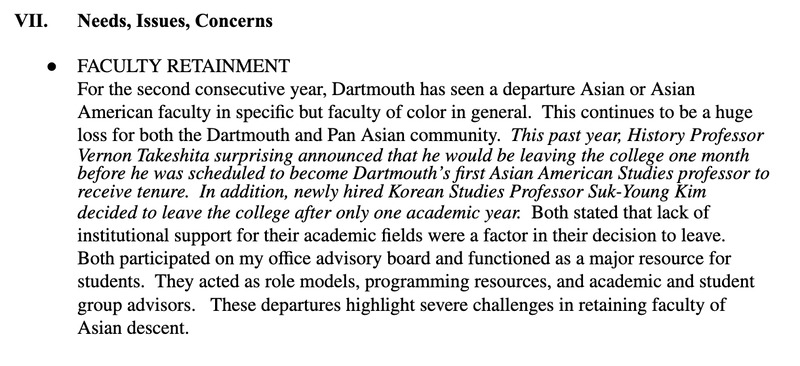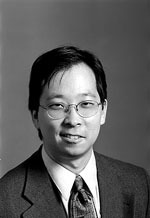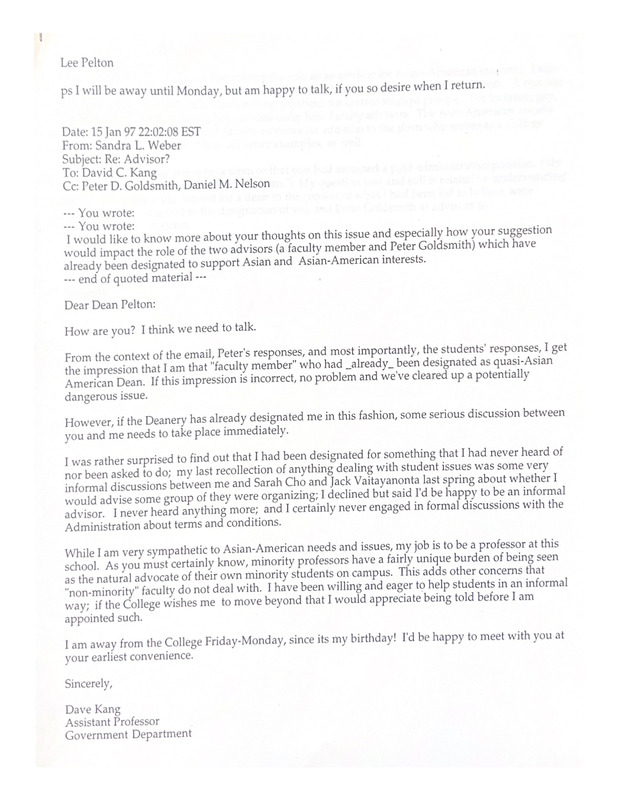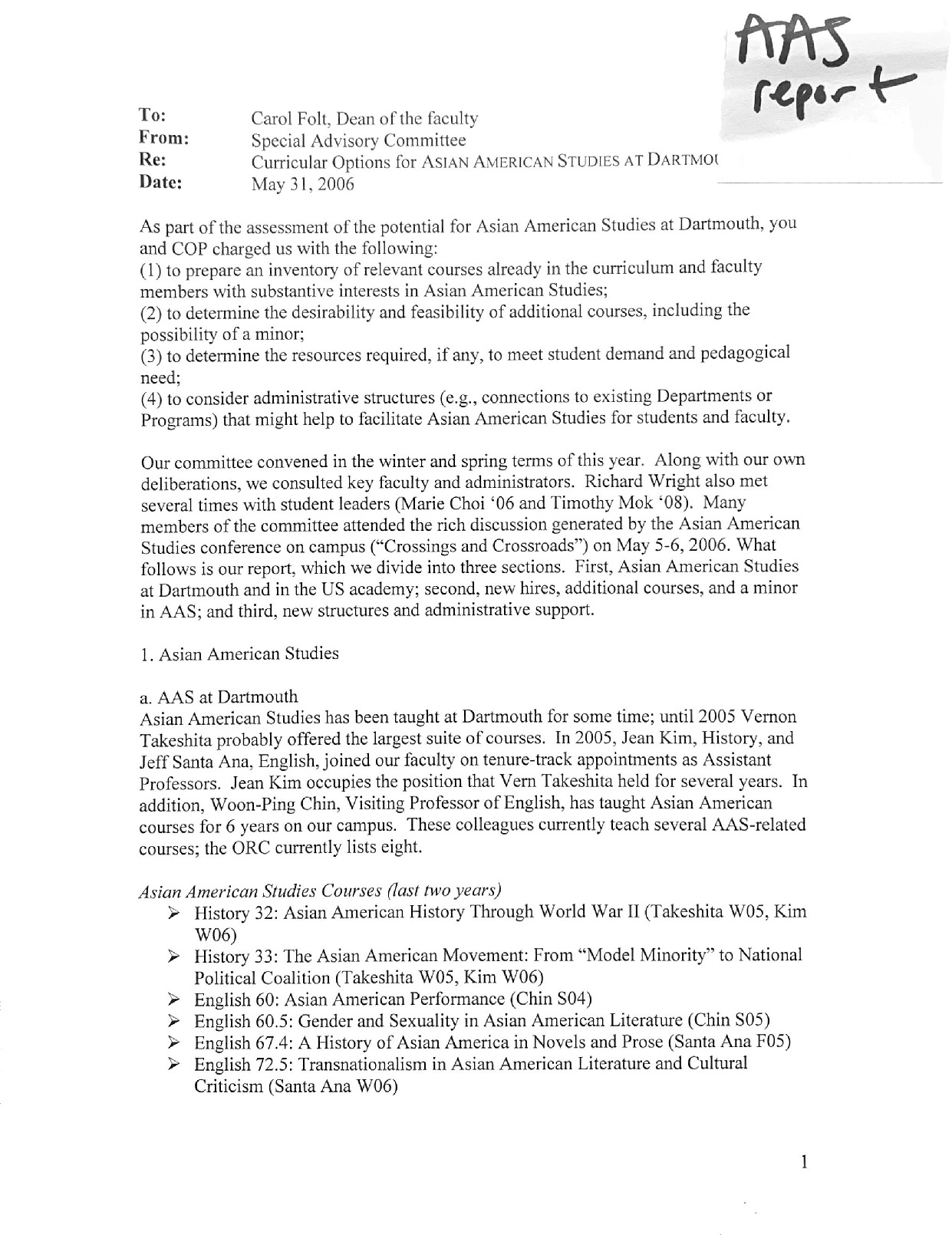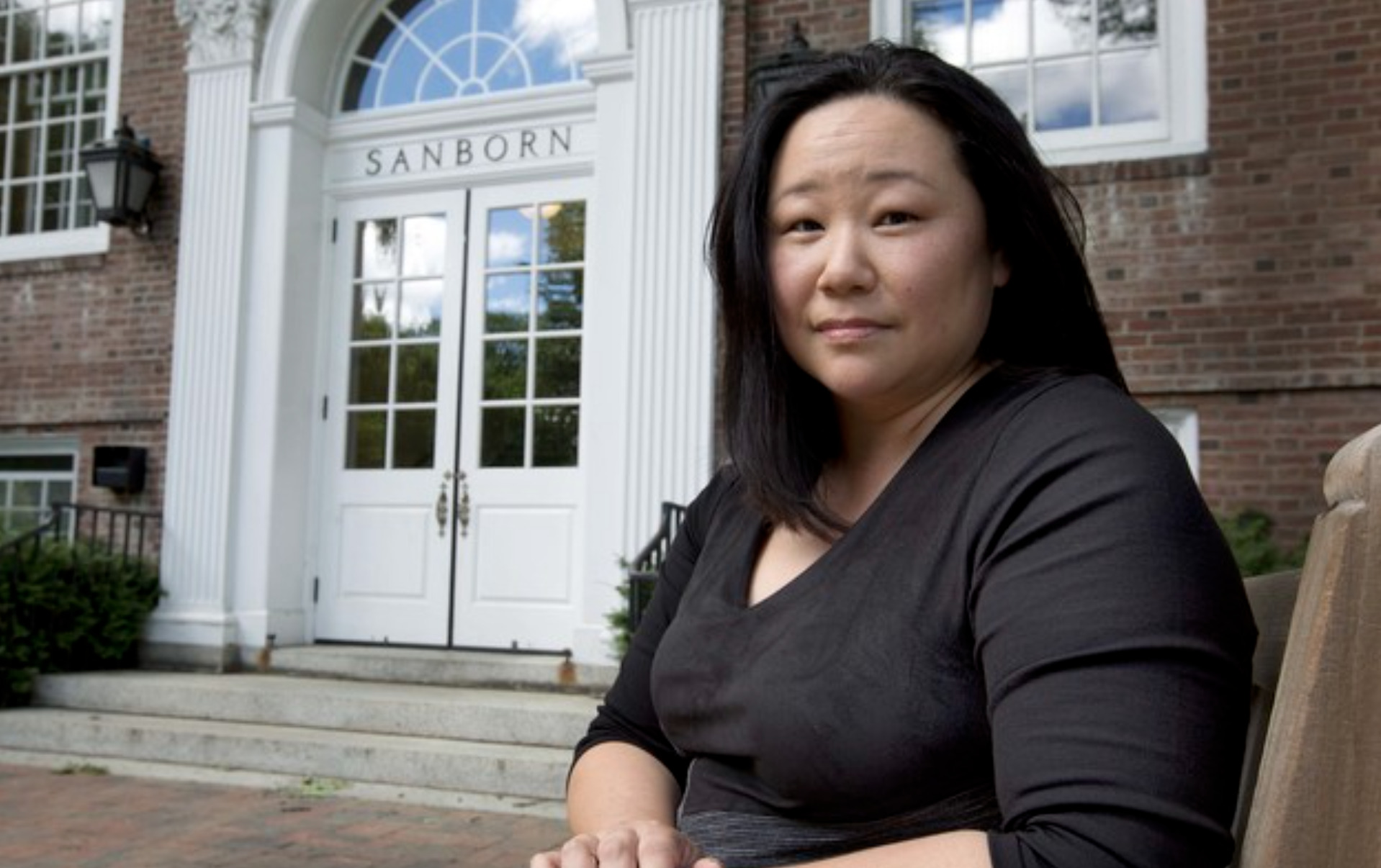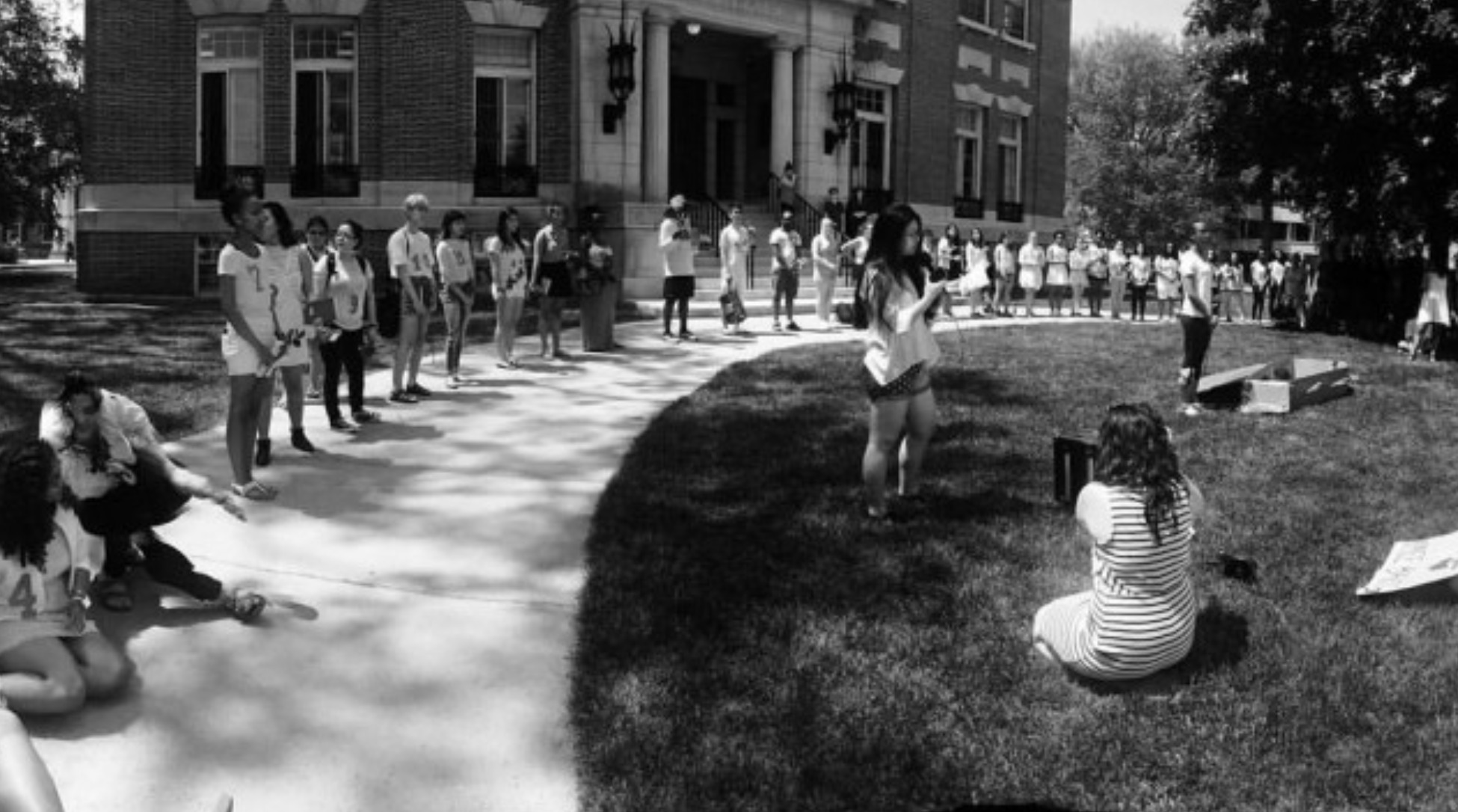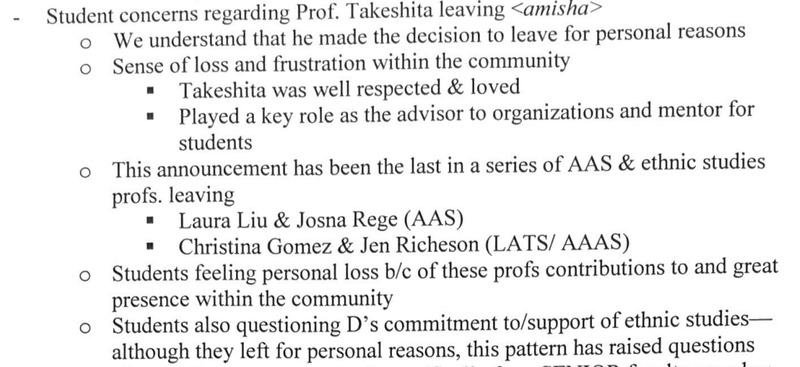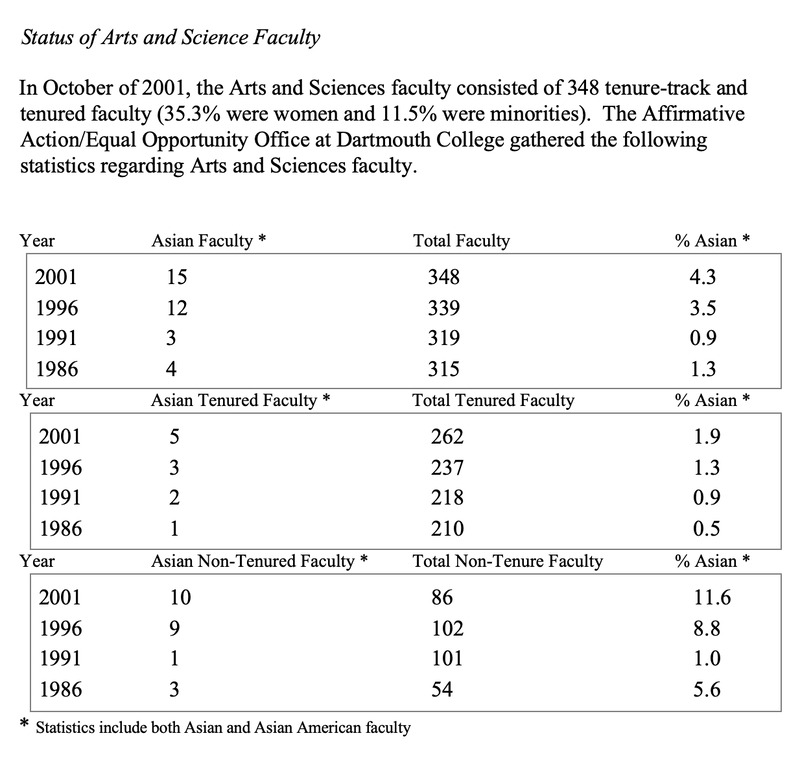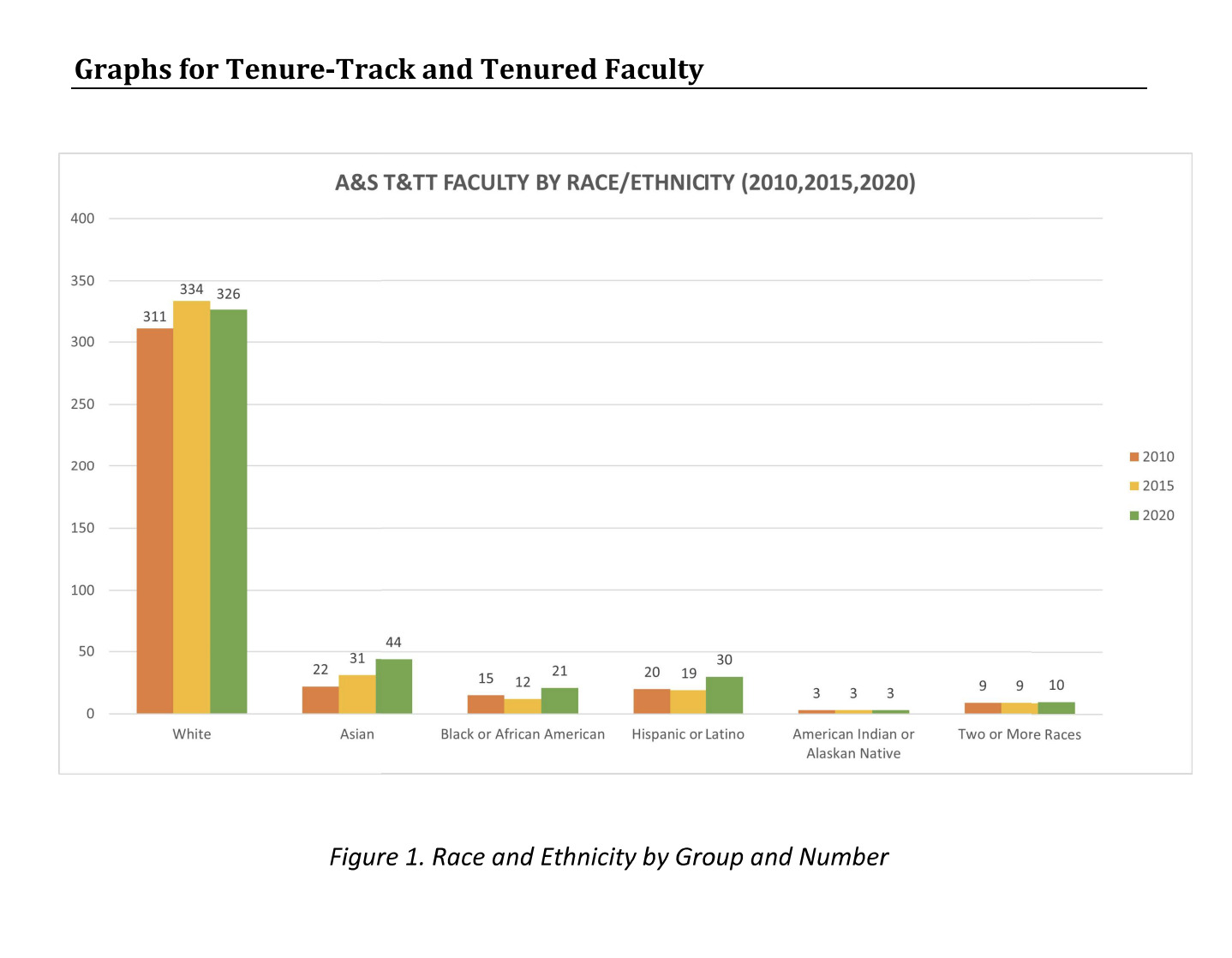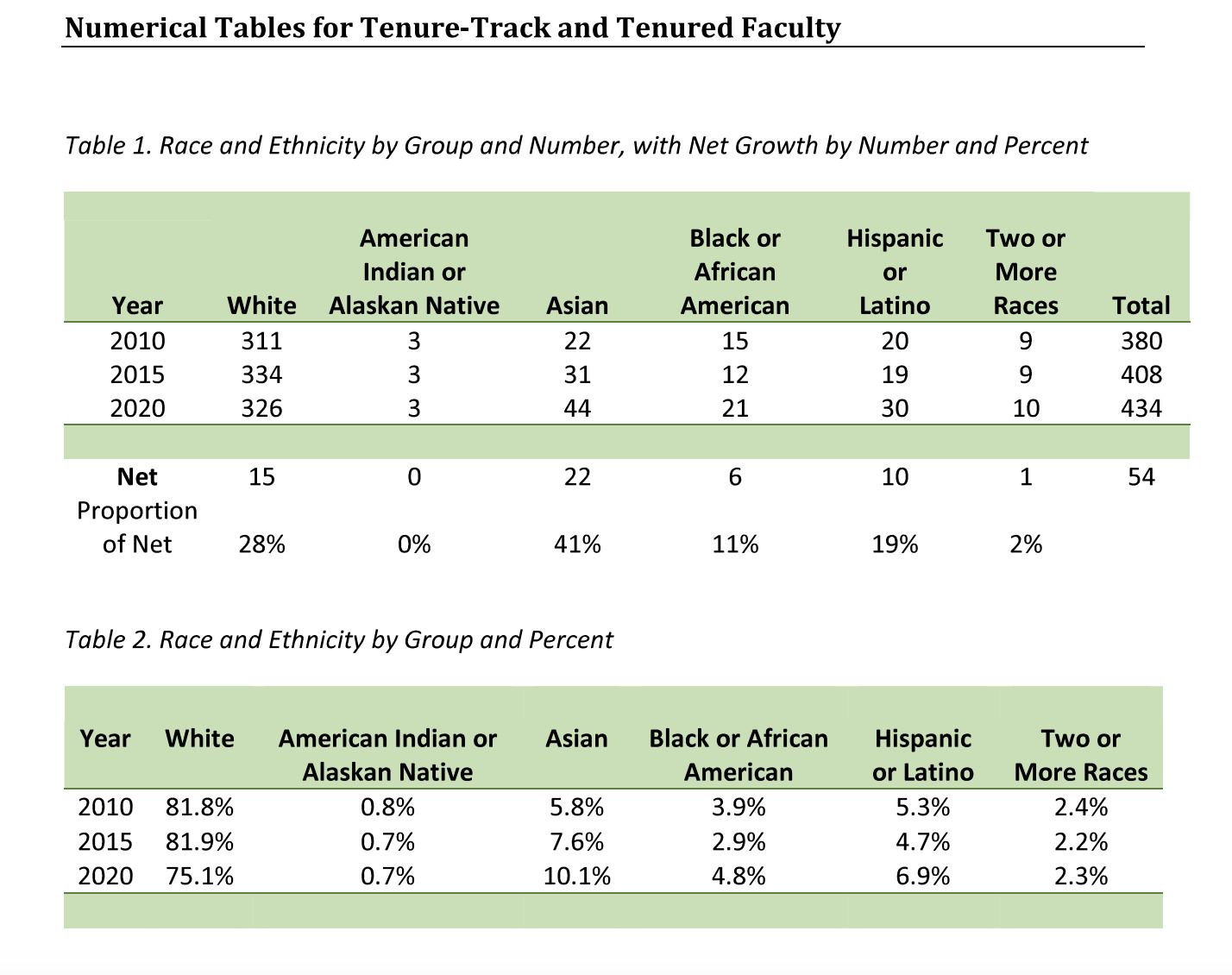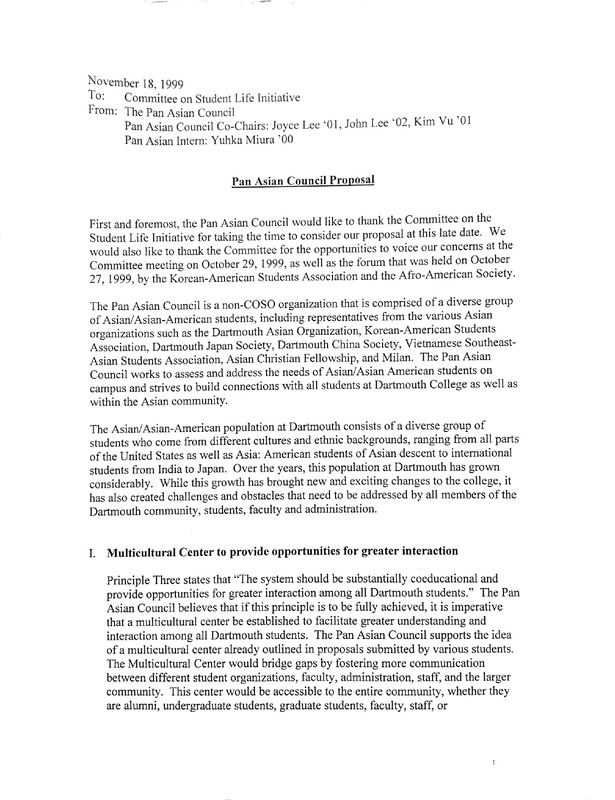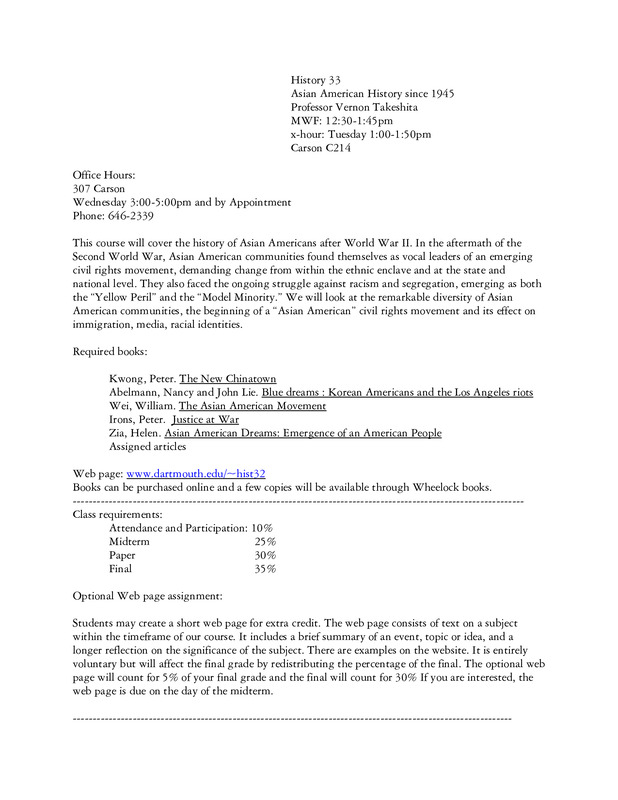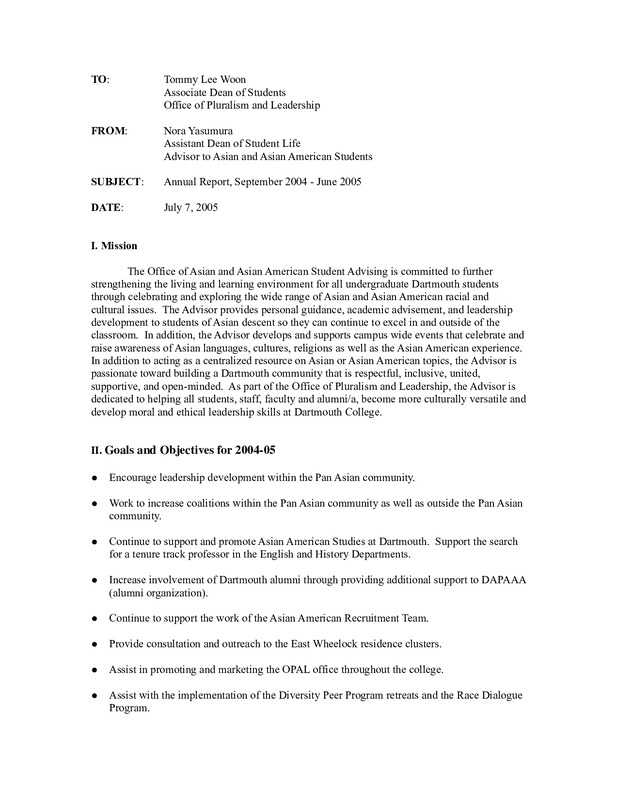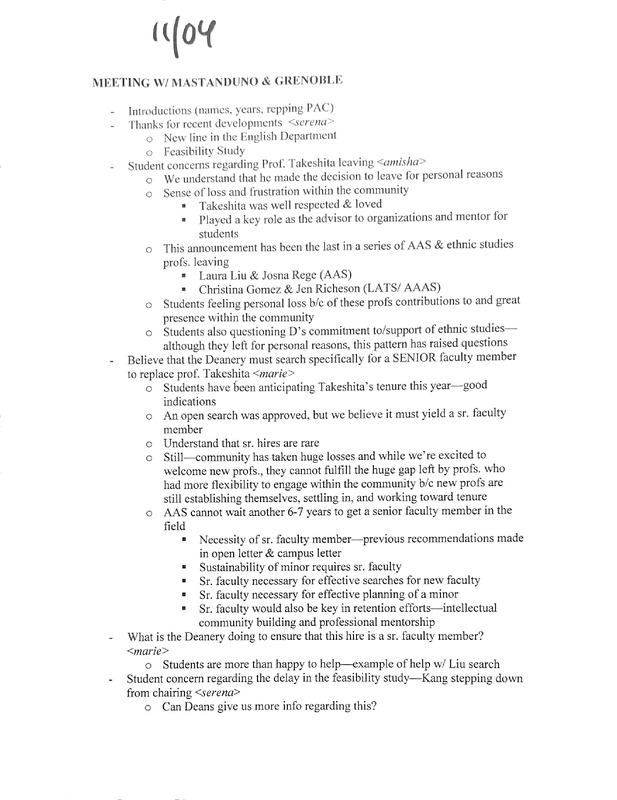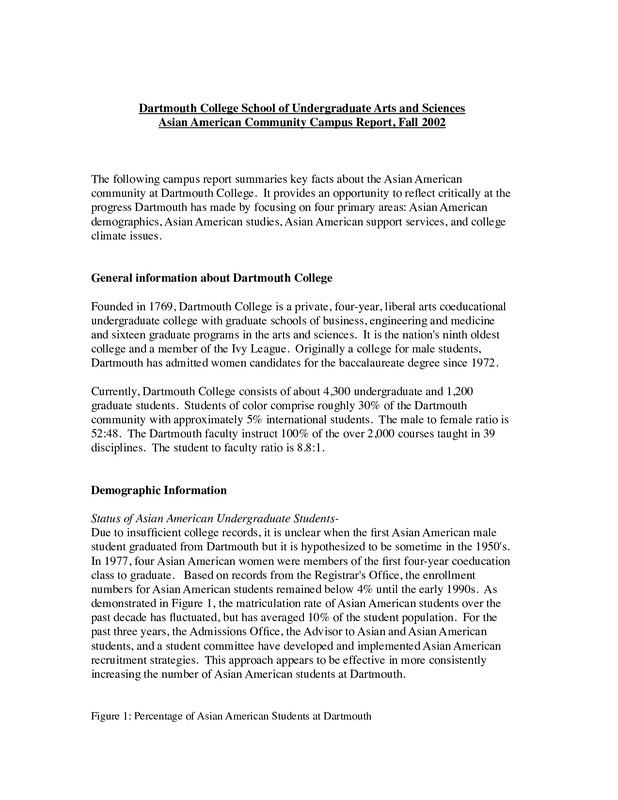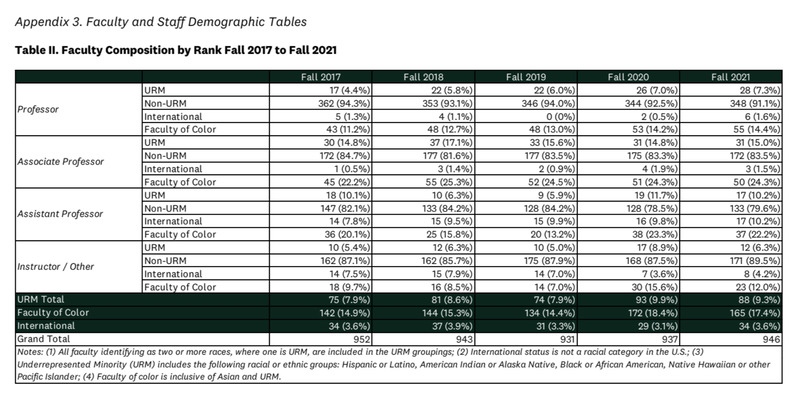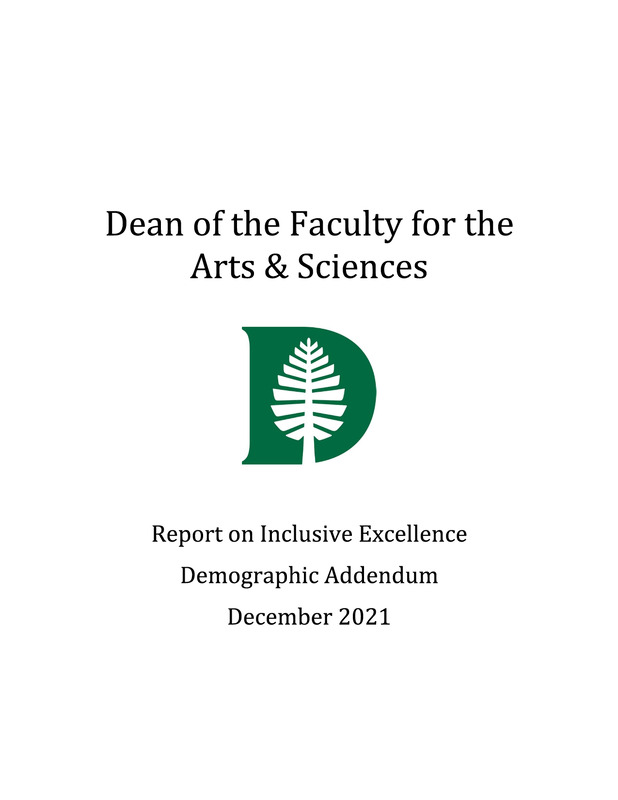Influence and Role of Faculty
Pan-Asian faculty have been instrumental in the nearly three-decades-long fight for Asian American Studies at Dartmouth. Beyond their roles as professors, they often served as important mentor figures for Asian and Asian American students who frequently struggled to find adequate institutional support—especially after the departure of OPAL’s Pan-Asian advisor, Nora Yasumura, in 2012. However, this added pressure to serve as defacto Pan-Asian mentors and advocates for Asian and Asian American students on top of juggling their professional responsibilities often led to issues of faculty burnout. The physical environment of Dartmouth as a rural, predominantly White institution further contributes to the constant revolving door of faculty and also poses a major barrier to attracting and retaining Asian Americanist scholars.
The Constant Revolving Door of Faculty
The Pan-Asian Council’s 1999 Proposal to the Committee on Student Life Initiative highlighted several demands to improve Pan-Asian student life on campus—including the demand for an Asian American Studies program/department. As part of the PAC’s demand for Asian American Studies, faculty retention is directly mentioned in the proposal as an issue that must be addressed. Asian American studies related courses are often taught by either postdoctoral fellows or visiting professors, creating inconsistencies in course offerings due to the refusal of administrators to hire permanent faculty who teach Asian American studies. The issue of the “revolving door of faculty” is a chicken and egg problem—it is difficult to draw in Asian Americanist scholars if we don’t have an Asian American Studies program or department, but we need permanent faculty in order to build a program or department for AAS.
1999 Pan-Asian Council ProposalD. The emphasis on permanent faculty for both Asian and Asian-American Studies cannot be stressed enough. It is incredibly hard for visiting faculty to invest in a community that is not their own. The students need stable figures to look towards when furthering their academic careers.
E. Professors and scholars whose academic fields focuses on multicultural topics are needed. There are few professors that a student can go to when he or she wants to pursue a topic that deals with multicultural issues.
Professor Vernon Takeshita: The First Asian American Studies Professor at Dartmouth
In 1997, Professor Vernon Takeshita taught the first Asian American Studies courses offered at Dartmouth: History 32 and 33, addressing Asian American experiences before and after World War II. In 1999, Dartmouth became invovled in a battle with Yale for Professor Takeshita. After Yale offered Professor Takeshita a tenure-track appointment and a higher salary, Dartmouth matched Yale’s offer and recommended Takeshita for a permanent position as an associate professor on the tenure track. Given his role as one of the very few professors teaching Asian American Studies at the time—and the only one in the history department—Professor Takeshita was highly valued by students who organized and lobbied for Dartmouth to match Yale and offer Takeshita a permanent position at the college. However, Professor Takeshita left the college in 2004, citing personal reasons, and has not been active in academia since then.
In her 2004 Annual Report for the Office of Pluralism and Leadership, Nora Yasumura—Assistant Dean of Student Life and Advisor to Asian and Asian American students—cites faculty retainment as a major concern. In addition to the departure of Professor Vernon Takeshita who was on track to become the first Asian American Studies professor to receive tenure, Korean Studies Professor Suk-Young Kim also left in 2004 after only one academic year. Yasumura's report further highlights the crucial role that Asian/Asian American faculty play as role models and mentor figures for students.
"Both [Professor Takeshita and Professor Suk-Young Kim] stated that lack of institutional support for their academic fields were a factor in their decision to leave."
Pan-Asian Professors as “Quasi-Asian American Deans”
In an email exchange between Professor Dave Kang from the government department and Dean Lee Pelton from 1997, Professor Kang conveys his frustration with the assumption that he was designated as a “quasi-Asian American dean.” Professor Kang's sentiments show the pressures faced by Pan-Asian faculty who take on additional responsibilities beyond their professional roles.
“I get the impression that I am that ‘faculty member’ who had already been designated as quasi-Asian American Dean…I was rather surprised that I had been designated for something that I had never heard of nor been asked to do”
“While I am very sympathetic to Asian-American needs and issues, my job is to be a professor at this school. As you most certainly know, minority professors have a fairly unique burden of being seen as the natural advocate of their own minority students on campus. This adds other concerns that non-minority faculty do not deal with.”
- Professor Dave Kang in response to Dean Lee Pelton
The Special Advisory Committee on Asian American Studies
In 2005, Professors Jean Kim (History) and Jeffrey Santa Ana (English) joined Dartmouth faculty on tenure track appointments “with the explicit goal of helping institutionalize Asian American Studies on campus.” Carol Folt, Dean of Faculty, formed a Special Advisory Committee to examine the curricular options for Asian-American studies at Dartmouth. In 2006, the ad hoc committee, which Professors Kim and Santa Ana served on, created a proposal and curricular plan for the Asian American Studies minor.
"The time has come for Dartmouth to move from an ad hoc collection of Asian American-related courses to offer a formal and coherent program in Asian American studies."
In the report, the committee calls for Dartmouth to search for two new senior hires to offer Asian American couses and move the college "toward the critical threshold of faculty and courses necessary to sustain an intellectual environment centered around Asian American Studies as well as an associated formal minor." The committee also speaks to the current state of Asian American Studies at Dartmouth in 2006 as "fledgling collection of courses built primarily around the intellectual interests of two young colleageus with newly minted PhDs." The disproportionate workload placed on nonwhite, junior faculty to teach ethnic studies courses is still an issue today. Even now, many Asian American Studies related courses are taught by postdoctoral fellows, and are thus often only one-time offerings.
"After several years of lobbying, the undergraduate Pan Asian Council shared with the President, the Provost, the Dean of Faculty, and other senior officers a petition in May 2004 listing 1115 signatures calling for the establishment of a minor in Asian American Studies."
In 2008, both Professors Jean Kim and Jeffrey Santa Ana resigned from their tenure-track positions after the proposal for a program in Asian American Studies was denied by administration. Following their departures, Professor Aimee Bahng was hired in 2009 as part of the English department.
Professor Aimee Bahng and the Fight for Faculty of Color
In 2016, Dr. Aimee Bahng was denied tenure after 7 years at Dartmouth as an Associate Professor of English—despite a unanimous department vote for approval. Dr. Bahng was one of very few Asian Americanists at Dartmouth, teaching courses such as Asian American Literature and Culture as well as Gender and Sexuality in Asian American Literature. In response, students rallied outside Parkhurst Hall in support of Dr. Bahng and the 36 other professors of color who left Dartmouth since 2002. A petition demanding tenure for Dr. Bahng was also created in response and garnered over 3,800 signatures, sparking the #fight4facultyofcolor campaign. News of Dr. Bahng’s story and the subsequent campaign advocating calling for the support of faculty of color, quickly spread nationwide and even internationally, with news outlets such as Vermont Public, Inside Higher Ed, Huffpost, and the UK’s Dailymail all covering the story and exposing Dartmouth for the lack of faculty diversity and mistreatment of faculty of color.
Dr. Bahng’s case was not an isolated incident, but part of a recurring pattern at Dartmouth. A 2016 article published by Inside Higher Ed contextualizes Dr. Bahng’s denial of tenure as indicative of the lack of institutional support for faculty of color, as well as the lack of support and respect for fields related to race, gender, and sexuality. The article mentions Cynthia Wu, a scholar of transnational and Asian American Studies who wrote to President Hanlon to ask him to reconsider the tenure denial, saying:
“For many of us in the field of Asian-American studies, this is not an individual matter. It is systemic. I have witnessed the dismantling of Asian-American studies through institutional refusals to retain faculty who teach and do research in this area. …I lament that so many specialists in Asian-American studies have fallen through the cracks because of these institutional failures."
Professor Cynthia Wu further echoes the sentiment that "faculty members who specialize in fields that foreground race, gender and sexuality often have above-average teaching and service workloads". The institutional failures place a disproportionate burden on faculty of color who are expected to take on additional responsibilities outside of their own teaching and research to help both students and push for institutional progress.
“Students disproportionately seek us out for mentoring,” Wu wrote. “We are disproportionately called upon to serve on committees pertaining to diversity initiatives. This increased workload undoubtedly impacts our ability to spend as much time on our research as our peers.”
The Adverse Effect of Revolving Faculty on Students
Following the departure of Professor Vernon Takeshita, the Pan-Asian Council met with Lenore Grenoble, Associate Dean of the Humanities and Michael Mastaduno, Associate Dean of the Social Sciences. As detailed in the meeting notes from November 2004, the purpose of the meeting between the Pan-Asian Council and Grenoble and Mastaduno was to discuss recent concerns regarding the departure of Professor Takeshita.
Students felts a profound “sense of loss and frustration within the community,” as “Professor Takeshita was well respected and loved…and played a key role as the advisor to organizations and mentor for students.”
The departure of Professor Vernon Takeshita in 2004 was also not an isolated incident, but the latest “in a series of of [Asian American Studies] and ethnic studies Professors leaving.” This included the departure of two other Asian American Studies Professors—Laura Liu and Josna Rege—as well as Professor Christina Gomez and Professor Jen Richeson from the departments of Latin American Studies and African and African American Studies, respectively.
The revolving door of faculty results in a cycle of loss for students, who are unable to find stable mentorship figures throughout their academic careers.
Without stable mentorship figures, the potential of students interested in pursuing ethnic studies, is squandered. Students, lacking sufficient institutional support, are either forced to find their own way, or turn toward other academic pursuits instead. The Pan Asian Council brings up this pattern of departures as a point of concern in regards to a lack of support from the College for ethnic studies. This pattern continues to repeat itself in a cyclical fashion, as seen with the continued departure of faculty of color throughout the 2000s and 2010s. Given this context, Dr. Aimee Bahng's tenure denial in 2016 was a breaking point for both students and faculty of color, culminating in the movement fighting for faculty of color at Dartmouth and beyond.
The Physical Barriers: Dartmouth as a Rural, Predominantly White Institution (PWI)
A campus report on the Asian American Community was written in Fall 2002 for the Asian Pacific Americans in Higher Education Conference at Columbia University. The report focuses on Asian American demographics, Asian American Studies, Asian American support services, and college climate issues. Demographic information on the status of Arts and Sciences Faculty shows the percentages of Asian faculty in total, as well as the percentage of tenured versus non-tenured Asian faculty.
From 1986 to 2001, the number of tenured Asian faculty increased from 1 to 5 professors. In 2001, out of 262 total tenured faculty, only 5 tenured professors were Asian or Asian American. In the course of 15 years, the percentage of tenured Asian and Asian American faculty increased from 0.5% to 1.9%.
In Fall 2022, the Office of Institutional Diversity and Equity released a three-year strategic plan “intended to unify Dartmouth's institutional diversity, equity, and inclusion efforts.” This plan, titled Toward Equity: Aligning Action and Accountaibilty, includes a list of 11 long-term actions to strengthen existing diversity and inclusion initiatives on campus. Cited among these action points is the development of “institutional strategies to recruit and retain diverse faculty and staff.”
Preceding the release of the Toward Equity plan, the Dean of the Faculty of Arts and Sciences shared the Arts and Sciences Inclusive Excellence Report in March 2021. The Demographic Addendum from this report includes a breakdown of tenure rates by race/ethnicity as well as racial demographics for faculty across the Arts and Humanities, Social Sciences, and Sciences. As shown in the graph and the tables from below, the percentage of tenured and tenure-track faculty of color are significantly lower than white faculty.
In 2020, faculty of color represented merely 24.9% of tenured and tenure-track faculty with 10.1% Asian, 4.8% Black or African American, and 6.9% Hispanic or Latino.
While the number of tenured Asian faculty has increased significantly from 1986, to 2020, there is still a significant lack of institutional support for Asian American Studies faculty specifically, as well as ethnic studies faculty and faculty of color as a whole. Further, when looking at racial demographics across academic disciplines, the Sciences report 18% Asian faculty while both the Arts & Humanities as well as the Social Sciences report a mere 5% Asian faculty. In light of these data, there must be more institutional investment and support for faculty of color to put an end to the revolving door of faculty, increase faculty retention, and strengthen the presence of ethnic studies at Dartmouth.

